Elon Musk Is Gaslighting America
Award-winning journalist Will Evans, who exposed Tesla's flagrant labor violations, reflects on having his work dismissed as "disinformation." Tesla CEO Elon Musk. (Jae C. Hong / AP)
Tesla CEO Elon Musk. (Jae C. Hong / AP)
Listen to the full discussion between Scheer and Evans as they talk about the wider issue with Silicon Valley and green washing, as well as the hypocrisy behind tech barons’ libertarian approach to government. You can also read a transcript of the interview below the media player and find past episodes of “Scheer Intelligence” here.
—Introduction by Natasha Hakimi Zapata
Robert Scheer: Hi, this is Robert Scheer with another edition of “Scheer Intelligence,” where the intelligence comes from my guests. In this case, it’s Will Evans, a highly regarded investigative reporter with Reveal, which is basically a radio investigative program carried on, I think, 450 stations. And it’s part of the Center for Investigative [Reporting] in Emeryville, California, which has filled in for the void left by the weakening of mainstream newspapers and news organizations, and does terrific work. And what Will Evans does, and what I want to talk to him about, is basically he’s looked into the sausage of internet life and how that sausage is made. He evaluated Uber and got all sorts of prizes for it, and the question of Silicon Valley’s discrimination against different categories of employees. And the one that’s gotten the most recent attention is he dared to look into the inner workings of Tesla, the electric car company that has been celebrated widely. And found, you know what, it ain’t that different than horrible working conditions at lots of assembly-line businesses, no matter how nouveau the product. So why don’t you really tell us what you found in this investigative series?
Will Evans: Sure, thanks for having me on here, appreciate that. We started looking into Tesla because we were hearing that there was safety problems there, people getting hurt. And it had this, as you say, it has this great reputation for being this futuristic, forward-thinking, world-saving company that’s going to, you know, bring sustainable energy to transportation and revolutionize how we do things. And a lot of people go there because of that. And what we found was that, under pressure to meet its production goals, it was really leaving safety, worker safety, by the wayside, and had prioritized cranking out cars as fast as possible, and left its workers dealing with all kinds of serious injuries. And then was actually trying to hide those injuries in order to make its safety record look better.
RS: You know, in a way, this sort of investigative series that you’re doing, and other people at the Center for Investigative [Reporting], really goes to the heart of how do we make things these days. And how does Apple make iPhones in China, and are people paid, what, two bucks an hour, or less or more, and what are the working conditions? And people are so enamored with the product, the slickness, the style. Tesla cars, you know, came in as high product, high quality and very expensive. They don’t want to look under the hood; they don’t want to look at how the sausage is made. And so give us the specifics. Because reading your series, it’s a guy gets his back busted when the, trying to assemble a car, or all sorts of bad products are consumed; paint destroys their health, and what have you. And we forget, it’s still–yes, robots are involved, but there are still human beings out there popping in and out of cars as they’re moving down an assembly line. And it has a lot of the downside of traditional manufacturing, and actually you pointed out Tesla had a worse record than the industry standard.
WE: Yeah, and what you see is, you know, all the–in manufacturing, you have a ton of manual labor, and a lot of heavy machinery and dangerous, potentially dangerous conditions. And a lot of, thousands of people working in that factory. And then you have the tech company operating almost like a startup that’s going very fast, growing very fast, changing things on the fly, as if it were as easy as to change some software. And you end up, those two things clash with each other, and people start getting hurt. And yeah, exactly, you have the guy who has the trunk of a Model X Tesla fall on his back when he’s inside, and he ends up getting sent back to work; you know, they tell him to just go back to work, he can barely walk. You have people, everything from getting your finger cut off, or they had an incident where people were sprayed with molten metal, electric explosions that burned people, breathing toxic fumes from chemical fires or from paint and adhesives, to just a lot of repetitive injuries.
RS: So you know, really what we’re talking about is a glamour industry of Silicon Valley in which very often they don’t even make money, but there’s a lot of venture capital goes into that. And then to justify it, they have to cut corners and squeeze. And in Tesla’s case, they’ve raised a lot of money, they’ve spent a lot of money, and they haven’t made a lot in the way of profits, and they’ve missed their production schedules. And so in a way, you have an old-fashioned assembly line speed-up, don’t you? Trying to get these workers to work harder, when in fact the conditions are not good. And then you rig the system: you have an in-house medical system that, as you documented, is involved in sort of cover-up and corruption of these injuries. Workers are not sent to care that they’re entitled to under workers’ comp. And then finally, a very aggressive medical practitioner, doctor, takes over this business, and he becomes complicit with their profit motives, rather than the health of the workers. Does that sort of summarize what you found?
WE: Yeah, that’s a good summary. I mean, I think they are under the gun to produce these incredible production goals that–I mean, it’s very difficult to meet those.
RS: You can say his name, you can say the name of the man who keeps promoting it.
WE: [Laughs] Well, right, so Elon Musk, right? He’s making a lot of promises, he’s got a lot riding on it. It’s a tremendously valuable company that’s not had a great record at actually making a profit, and has missed goal after goal after goal. And so, yeah, his future is riding on this, the future of the company is riding on this, and the answer has been to just work the hell out of these workers, and do things so fast that precautions aren’t being taken. And safety is not going to get in the way of something that–that’s what, we would talk to these safety professionals who worked in the factory, and they’re hired by Tesla to evaluate the–why people are getting hurt, and try to solve that. And they would come up with these fixes or make these warnings, and say hey, look, someone’s going to get really hurt, someone’s going to die. And they were told again and again that, look, we need to do this this way, Elon wants it, we need to keep the cars moving. And some of them left in disgust, and some of them were fired after raising concerns over and over again. And so, and these are people who, some of them come to Tesla because they really believe in the vision, and believe in Elon Musk. And then they’re disillusioned when they see, on the factory floor, people getting hurt in the name of progress.
RS: So really what it’s about is hype. And these events go unexamined. I mean, why did it remain for you to do this kind of investigation? You got wind of these things, but basically these people were rigging or undermining a system that is supposed to protect workers. If you’re injured, it’s supposed to be reported; you’re supposed to get treatment, right? You’re supposed to–what’d they do? They send people in a Lyft or an Uber to get care?
WE: [Laughs] Right, to the emergency room.
RS: And really, cover up–the whole thing reeks of kind of just old-fashioned cover up, you know. And yet using professionals, doctors and others, to look the other way. And the few people who object, the whistleblowers, they end up getting fired.
WE: Yeah. I mean that, I think that’s why it is hard to unearth this stuff, and some companies get away with it, is because the people who know what’s going on are very fearful that they will, their careers will be ruined if they speak up, that they’ll be sued. I mean, Tesla is very aggressive against whistleblowers. The people who worked for the medical clinic that I talked to have faced threats of legal action; they’ve been reported to the medical board; various forms of retaliation, really, for speaking up about what they saw. And many of them don’t want to talk at all–or will say I’ll talk, but don’t use my name. And so you need to find–you know, I need to find, like, those few courageous individuals who were so upset at what was going on that they’re just willing to risk it. That’s how you know that it really is extreme and serious, where you’d have this medical clinic that was seemingly designed to avoid having any record of these injuries, and a doctor who is operating under a lot of pressure to keep these injuries dismissed, or off the books, or not on workers’ comp. And you have this profit motive driving that. And a lot of people are afraid of both that doctor, they’re afraid of Elon Musk, they’re afraid of the power of Tesla. And so it’s hard to get that out.
RS: And they’re also afraid that it’s a lousy job market for good-paying jobs. You know, we have a lot of young people graduating now, getting out there in the field, and they can’t find–and here you have a glamour job. But let me ask you something about an old-fashioned check and balance that we used to have with labor unions. And that’s sort of not dealt with extensively in your articles, but there is a sort of subtext of keeping a strong union out. Now, it used to be if you were on the Ford assembly line, or General Motors or something, you had shop stewards; you had people, and if somebody was injured, they’d go to their shop steward and say, hey, you know, I just busted my arm, I got to go to emergency, they don’t want to send me. There was a check on the power of the people running the factory. Here, Elon Musk, according to your article, was able to say I don’t want yellow caution tape used around the scene of an accident, because it’s depressing. How do you get that kind of power? What kind of union, what kind of check and balance do they have within the Tesla plant?
WE: Well, so there is no union. That’s the short answer. The UAW was trying to organize, and the company was, fought that effort. And the union has claimed that a lot of its supporters were let go under the guise of layoffs and firings for, you know, production reasons. And then you have, I think there’s still some pending labor relations complaints in terms of how the company dealt with that. But the bottom line is that there is no union. The company and its supporters, and Elon, sees this all as sort of an attack on him and on the company, that people want to see it fail. He argues that, you know, the unionized plants don’t have better records for their workers, and that workers would be worse off with the union. And so far has gotten away with that, and has used the union as this sort of bogeyman–they tried to attack our reporting by saying it was part of some coordinated attack with the union. Which, I mean, we had nothing to do with that, but it’s a convenient excuse. They went as far as to say that we were an extremist organization when we came out with that first piece.
RS: “We” being the Center for Investigative Reporting?
WE: That’s right, yeah. They called Reveal an extremist organization.
RS: OK–
WE: –working on a disinformation campaign. And then another point, he went on to attack journalists in general for being beholden to the fossil fuel industry because of advertisements, and that that’s why journalists are out to get Tesla. And there’s this sort of a complex of, like, that they’re being persecuted. And when someone pointed out that, hey, over here at the Center for Investigative Reporting we don’t even have advertisements, we’re a nonprofit, he went on Twitter and he called us just a bunch of rich kids from Berkeley who took their political science professor too seriously. That was his diss. [Laughs]
RS: So let me–I mean, I want to get at that. Because there’s an aspect of this that relates to green washing, PR, how you spin. And this is not the old Ford company, Henry Ford, and you know, he’ll break the union and call the National Guard out and have his own police force and so forth–no! These people are on the side of enlightenment. And in the enlightened state of California, which is supposed to be deep blue, and you have these progressive governors like Jerry Brown was there during this critical period–the question I want to ask, we’re going to take a break for a minute, but when I come back with Will Evans from the Center for Investigative Reporting, the Reveal series, you can get this on their website. But basically, this is not happening in the Deep South with runaway shops, you know. This is happening in California. And what about all the laws that exist to protect workers when they’re injured, and their rights, and so forth? [omission for station break] I’m back with Will Evans, and we’re talking about his incredible series, really, on how the sausage is made in Silicon Valley. In this case we’re talking about Tesla cars; they’re shiny, they’re wonderful, people like looking at them, they’re expensive, now there’s actually one that’s more reasonably priced. And as with Apple phones, as with all of these products from the new tech industry, they’re not examined very carefully. And when you read this series you understand, no, people get their backs broken, they inhale dangerous fumes, all sorts of bad stuff happens, and it’s covered up. So I want to ask you, what about the state? The state of California has been very pro-electric car. And they actually have given Tesla, through various breaks and so forth, in one of your articles I think it said a $200 million state subsidy. And there’s also federal subsidy. So this is not just free enterprise doing what it has to do; this is a highly subsidized government entity, on the one hand, and yet government is not doing its due diligence of protecting workers in these plants in terms of occupational health and safety. Is that not a big contradiction?
WE: Yeah, there’s a couple of things working here. One is the focus in California on combating climate change and wanting to incentivize sustainable energy, and having these programs to provide tax exemptions to encourage that. They’re using a lot of–you know, Tesla’s the biggest recipient of these tax exemptions. And it’s because it’s like the–you know, it’s this huge hope for electric transportation. And so I think there’s a reluctance to turn that off, because of what it means for–what it promises for sustainable energy, but also in terms of what it promises for jobs. It’s the only car maker here in the state; it provides a lot of jobs. And so it has a lot of support, and powerful support, because of that. And people don’t want to see it leave, and they don’t want to see it go to another state or country. And so you might see a little bit of a lighter touch there. You also have the issue of worker protections, in terms of health and safety protections. They’re not all that strong, here or anywhere else in the country, in terms of how much you get fined for a–you know, when a worker dies, or gets maimed, and it’s deemed the company’s fault and a safety violation. I mean, these are–at most, you’re talking about like over $100,000, or maybe you get tens of thousands of dollars. Maybe you get much less than that, and then it gets reduced because of other, you know, in settlement negotiations. And that’s just not enough to change a company’s practices, I don’t think.
RS: You know, there’s a kind of a, there’s an important cultural critique in your articles. This is a very important series on Tesla, but in the other articles that I’ve read by you, whether it’s Uber or just generally in Silicon Valley, there’s a conceit that they are enlightened. They’re not like the old, industrial barons, and they’re not the people who do strip mining and so forth. That they’re on the side of the angels. So when a lot of, when people were jumping, workers in China jumping out of the window of their dormitories and so forth in desperation, and when we read about the low salaries paid for most of these shiny gadgets–people love the Tesla, and you give fairly wealthy people a tax break to buy one. And let me just, full confession, I own an electric car. I even own a Chevy Bolt, I hope the working–maybe you should tell me about the working conditions, better there, do they still have some check and balance of unions? I don’t know. But the fact is, we’re intrigued–we have an aura of progress, and yet they’re these shiny toys, and we–it’s too good to check. We really don’t want to know how they’re made. Isn’t it–and the reaction to your series was not one that brought about major change or scrutiny. They kind of shrugged it off. And they attacked, they shot the messenger; they attacked you for doing the series, the Tesla folks.
WE: That’s true, and there’s a lot of Tesla supporters, and I don’t think this is unique to Tesla, although I think there is more of a sort of cult following and a belief in the inherent wonderfulness of its leader. But there is a lot of people who just don’t want to hear any criticism, and who see any criticism as an attack, and a cynical attack, and something that is trying–you know, from the forces of darkness that are trying to undermine this great, progressive company that’s going to, you know. And it’s certainly not the only Silicon Valley company that says it’s doing good. So I think it is interesting, and representative in some ways of these, the image, the sleek image of do-gooder companies with an underside that no one wants to hear about. I think you’re right about that.
RS: Well, and it’s also the modern economy. I mean, you know, this is how things are going to be made, and if you don’t like–if the company says well, you’re enforcing these–like you say, they’re afraid in California they’ll take the company elsewhere. They’ll take it overseas, and they’ll find a [workforce], they’ll find governments that look the other way. And that’s really the challenge here. No one denies that we should move to a different kind of transportation, and that electric cars are critical to that. And you can even applaud the effort put into that by different engineering groups, and what have you. But at the end of the day, your description is one that–I wouldn’t say quite comes out of Dickens [Laughter]. But it’s certainly, I mean, people get their bodies destroyed, and they’re told to what, take a Lyft or an Uber and go check it out, and it’s got nothing to do with us, and the government looks the other way? The same government that, I mean, the figure you used I think was $200 million California has given in subsidies? And that government says we’ll subsidize you, but we don’t really care how you make this thing, and the working conditions, and so forth? I mean, that–that’s a prescription for disaster if that becomes the norm in production. And Silicon Valley is certainly the trend center.
WE: Yeah, I mean, I think there’s a–there’s probably people who think that, well, it’s better, even with the current conditions, it’s probably better that it’s being produced here in California than in China. So, you know, and these jobs do pay, and are seen as good jobs by many in the Central Valley. But that’s like only a good job until you get hurt and can’t work anymore, and you end up losing, sleeping in your car, as one of our, one of the people we talked to, had happened to him. I mean, it’s–you know, some people love it, but then, yeah, if you get destroyed by it, that–it’s not worth it.
RS: Well you know, just as a final point, we’ve kind of anointed these new industrialists as somehow prophets of a future, you know, whether it’s at Apple or Google or Tesla or Facebook. They’ve got the magic wand; they know where it’s all headed. And now, there’s sort of, there’s a pushback even from those same people. Tim Cook at Apple, for instance, has said look, we can’t exploit privacy, and we have to care about individual freedom, and we’re going too far. And what you have in Elon Musk is sort of the poster boy for that arrogance. He just shrugged it off. You could do investigative reporting, you had the facts, it’s solid as can be–and they just don’t have to care, because they’re the wave of the future, right?
WE: [Laughs] Yeah, I mean, he not only shrugged it off, but said it just wasn’t true. Said we were, you know, just basically lying, and that’s all. You know [Laughs], there was no, sort of–you know, you’re right, we could do better; it was just, ah, these guys are just lying, and don’t pay any attention to that. And that is scary. That is a scary thing, where there are so many people who are just willing to believe whatever he says on any subject. And I think it is a lesson for, you know, don’t believe the hype, for a lot of these tech leaders.
RS: Well, let me ask you a question structurally about the news business. You were honored by the Investigative Reporters and Editors with an award; your work is highly regarded. So in this case, the character assassination–attacking you, and challenging your motives–didn’t quite work. But I think what you do at Reveal, you know, goes out very wide. I know in fact the station that I’m doing this for, KCRW, carries Reveal; most of the NPR stations do. I think the figure is like 450 or something stations carry it. Do people care? Or is this just, you know, OK, nice, glad you called attention to it, but I want one of those shiny objects and I really don’t care how my iPhone is made or how my electric car is made. Is that what you’re getting?
WE: I think, I actually think there’s a lot of people who care. I don’t know how to measure it, but there was a lot of interest in this story. You know, a lot of pickup, a lot of other publications, a lot of people wrote in. There–it’s partly because it’s one of those companies that is fascinating, and that people are paying attention to, and does represent in some way the future. And so even people who don’t, who aren’t in the market to buy a Tesla, are kind of intrigued and interested in it. And there was–I mean, I definitely hear from people who are upset about this, and who have had their opinions changed, either by this in conjunction with other stories, but just sort of–they have come around to the idea that maybe, maybe some of these tech leaders–and you see it with Facebook, too, right? They’ve had their bubble pierced. You know, that these tech leaders are no longer, should no longer be seen as invincible or that they can’t do, that they can do no wrong. I think that they’re, that people are sort of waking up to the idea that there are problems with even companies that you want to believe in.
RS: So that leaves us, finally, with the big idea that I got out of your series. And it’s not the only place, as you say, with the Facebook controversy now; with the, you know, controversy about how Google uses our data. But it goes to a larger question. These companies have escaped serious regulation–antitrust, you know; accountability. Whether it’s occupational standards on a state level, tax subsidies, communities have fallen all over themselves to attract these companies, and so forth. And there are two questions to raise about it. First of all, who’s going to buy these products if they’re not able to make a decent living, or if they’re not able to sustain their life, or they sacrifice their bodies to make it? I mean, what world are you creating? But also, they have actually, out of a kind of a libertarian ideology, denied the value of government. Assumed that government is something just old-fashioned, and regulation just gets in the way of progress. And yet, as you point out in your articles, without government subsidy we wouldn’t have had Tesla move to this point. And in fact, companies like Google came out of defense department research and, you know, a lot of government funding. And you really, at the end of the day, came up against the basic contradiction for Silicon Valley: is this thing too shiny, a distraction from the reality of life, of how things are produced, how people make a living, and how they can survive.
WE: Well, I think you hit on something that I think is interesting for a lot of the Silicon Valley industry, which is this idea that they’re–you know, it’s a cliché now, but that they’re disrupting this, and revolutionizing that. And a lot of it is new, and this disruption and this sort of “we’re breaking the rules” is seen as a good thing, and a driver of innovation. And the only way that many of these companies–Uber, or whatever it is–can, made it in the first place, and can survive, is by breaking a lot of rules. And some of those rules maybe we’re OK with breaking. And then when you start breaking labor regulations and things like that, then you know, are we still OK with it? I don’t know. And how do you regulate it? Now, when it’s something where you’re talking about gig workers, who aren’t, don’t have minimum wage or all kinds of other protections, or when you’re talking about autonomous vehicles, how do you, what do you do with that? When you’re talking about the tremendous power that Facebook has, that’s something we haven’t dealt with before. And I think there’s probably a lot of grappling that needs to be done with that. But in the meantime, if you’re an entrepreneur, you’re thinking, like, I need to break things in order to succeed. And so the more things that get broken, you might see some troubling things come out sooner or later.
RS: And we seem to be on the cusp of that now, because actually there is, you know, the Federal Trade Commission is–there’s a lot of movement to take a second look at how these companies operate. And some–as I say, Tim Cook is one–have even suggested maybe that’s a good thing. So why don’t we leave it at that–maybe the long-run impact of this kind of reporting will be quite beneficial, hope so. If people want to follow this article, they should go to the Center for Investigative Reporting. What’s the quickest way to get it? Go to Reveal, CIR?
WE: Yeah, RevealNews.org.
RS: OK. RevealNews.org. Thanks again, Will Evans. And our producer for “Scheer Intelligence” is Joshua Scheer. Our engineers at KCRW are Mario Diaz and Kat Yore. Sebastian Grubaugh here at the USC Annenberg School for Communication and Journalism provided another exemplary engineering effort. See you next week with another edition of “Scheer Intelligence.”
Your support is crucial…
With an uncertain future and a new administration casting doubt on press freedoms, the danger is clear: The truth is at risk.
Now is the time to give. Your tax-deductible support allows us to dig deeper, delivering fearless investigative reporting and analysis that exposes what’s really happening — without compromise.
Stand with our courageous journalists. Donate today to protect a free press, uphold democracy and unearth untold stories.

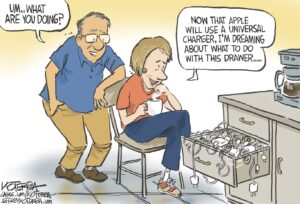
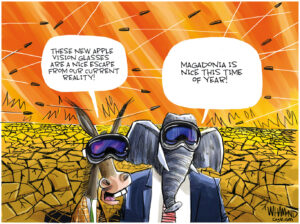
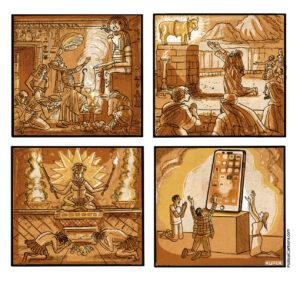
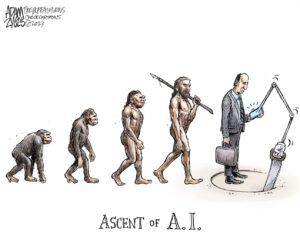

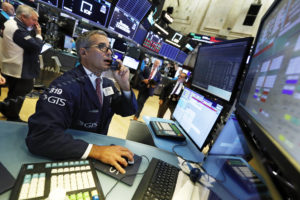


You need to be a supporter to comment.
There are currently no responses to this article.
Be the first to respond.